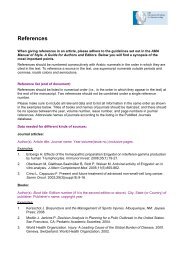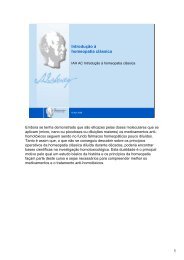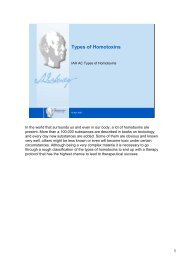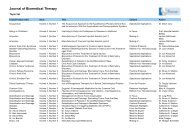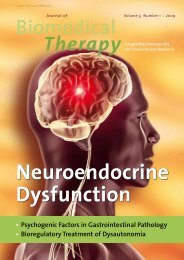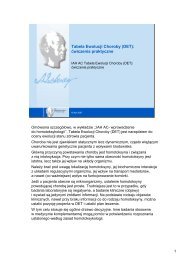Metabolic Syndrome - International Academy of Homotoxicology
Metabolic Syndrome - International Academy of Homotoxicology
Metabolic Syndrome - International Academy of Homotoxicology
Create successful ePaper yourself
Turn your PDF publications into a flip-book with our unique Google optimized e-Paper software.
) What Else Is New?<br />
New scientific findings suggest<br />
that artificial food colors and<br />
additives (AFCAs) are associated<br />
with increased hyperactivity in<br />
children.<br />
More evidence on<br />
Soda: Is just one a day too<br />
much for your heart?<br />
Does TV make children<br />
smart?<br />
artificial food colorings<br />
) 8<br />
and hyperactivity<br />
A randomized, double-blinded, placebo-controlled<br />
clinical trial published<br />
in The Lancet presents additional<br />
evidence that artificial food<br />
colors and additives (AFCAs) in the<br />
diet cause hyperactivity in children.<br />
The 153 3-year-old children and<br />
144 8/9-year-olds included in the<br />
study consumed either a placebo<br />
mix or test drinks containing sodium<br />
benzoate preservatives plus one<br />
<strong>of</strong> two AFCA mixes (A or B). To assess<br />
hyperactivity levels in both age<br />
groups, the researchers used aggregated<br />
z-scores <strong>of</strong> observed behaviors<br />
and ratings by parents and<br />
teachers. In addition, the 8/9-yearolds<br />
took a computerized test <strong>of</strong> attention.<br />
Compared with placebo, mix A had<br />
statistically significant adverse effects<br />
on 3-year-olds, whereas mix B<br />
did not. The 8/9-year-olds showed<br />
statistically significant adverse effects<br />
from both mixes. The authors<br />
concluded that artificial food colors<br />
and/or sodium benzoate preservatives<br />
in the diet result in increased<br />
hyperactivity in 3-year-old and<br />
8/9-year-old children in the general<br />
population.<br />
The Lancet<br />
2007;370(9598):1560-1567<br />
Increased consumption <strong>of</strong> sugary<br />
drinks, already linked to obesity and<br />
diabetes among children and teens<br />
and to high blood pressure in adults,<br />
may also increase the risk <strong>of</strong> metabolic<br />
syndrome, which in turn increases<br />
chances <strong>of</strong> developing heart<br />
disease and/or diabetes. A new<br />
study published in the July 31 2007<br />
issue <strong>of</strong> the American Heart Association’s<br />
journal Circulation found that<br />
the prevalence <strong>of</strong> metabolic syndrome<br />
was 44 to 48 percent higher<br />
among people who drank as little as<br />
one soda a day, either diet or regular,<br />
as compared to those who drank<br />
less than one.<br />
The study did not determine whether<br />
soda consumption constitutes a<br />
true risk factor in itself or is simply<br />
a marker for other behaviors that<br />
promote metabolic syndrome. People<br />
who drink soda habitually also<br />
tend to consume more total calories<br />
and high-fat foods, smoke more,<br />
and exercise less than people who<br />
do not. Sodas may also displace<br />
healthier beverages in the diet or encourage<br />
a sweet tooth.<br />
Needless to say, the soda industry<br />
took issue with the findings.<br />
Circulation 2007;116:480-488<br />
Child psychologists and pediatricians<br />
advise beginning early with<br />
normal social interactions with other<br />
toddlers, using normal language<br />
(not baby talk) with babies and toddlers,<br />
and finding playful ways to<br />
introduce children to logical processes.<br />
But parents don’t always have<br />
a lot <strong>of</strong> time to spend talking to their<br />
babies, keeping them occupied, or<br />
reading to them on a regular basis.<br />
That’s why parents in the USA are<br />
increasingly using television, with<br />
its special children’s programs, as an<br />
educational aid. A recent study explored<br />
this topic, asking whether<br />
TV promotes child development or<br />
whether parents simply permit TV<br />
watching for egotistical reasons.<br />
In a telephone survey, 40 percent <strong>of</strong><br />
parents admitted to allowing their<br />
three-month-old babies to watch<br />
television on a regular basis. According<br />
to the same survey, 90 percent<br />
<strong>of</strong> two-year-olds spend 1.5<br />
hours a day in front <strong>of</strong> the TV. The<br />
respondents said they believed television<br />
would help their children develop<br />
language skills, but they also<br />
admitted that they used television to<br />
keep kids entertained and as an<br />
electronic babysitter.<br />
Arch Pediatr Adolesc Med<br />
2007;161:473-479<br />
Journal <strong>of</strong> Biomedical Therapy 2008 ) Vol. 2, No. 1



